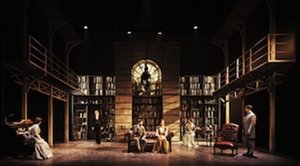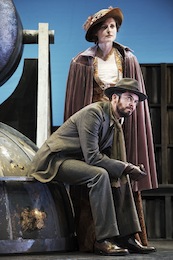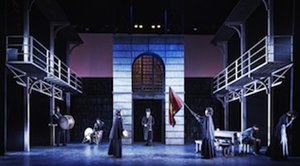On the surface, Major Barbara does tick a lot of the ‘summer show’ boxes. The determined criteria meant to lure in the tourists are there. There are gorgeous period costumes (beautifully designed by Joan O’Clery). The language is intelligent, ‘posh’ and seemingly inoffensive (even the lower class slang is politely dated). The closest thing to an open expression of libido is a brief kiss or two with slightly parted lips. Sure, what harm could any of it do?
 The answer is: plenty. The beauty of Shaw is his ability to upend a viewer’s moral universe with an ease that is paradoxically both nimble and explosive, pulling back the sheen of polite society that thinly masks the workings of a world ruled by “money and gunpowder”. And director Annabelle Comyn’s production, while seemingly conservative in its approach, has done well to let Shaw’s arguments regarding the collusion of governments, gun dealers and evangelists do the thematic heavy-lifting, as it were. This doesn’t mean we get a staid and bland piece of heritage theatre, though. Comyn and her cast have worked quite hard to inject flesh and blood vitality into Shaw’s dizzying polemics. The result is a stealthy bit of summer programming that may lure punters in with the familiar signposts of a period drama, but that ably disarms them by challenging the received perception of power structures that have persisted since the play premiered back in 1905.
The answer is: plenty. The beauty of Shaw is his ability to upend a viewer’s moral universe with an ease that is paradoxically both nimble and explosive, pulling back the sheen of polite society that thinly masks the workings of a world ruled by “money and gunpowder”. And director Annabelle Comyn’s production, while seemingly conservative in its approach, has done well to let Shaw’s arguments regarding the collusion of governments, gun dealers and evangelists do the thematic heavy-lifting, as it were. This doesn’t mean we get a staid and bland piece of heritage theatre, though. Comyn and her cast have worked quite hard to inject flesh and blood vitality into Shaw’s dizzying polemics. The result is a stealthy bit of summer programming that may lure punters in with the familiar signposts of a period drama, but that ably disarms them by challenging the received perception of power structures that have persisted since the play premiered back in 1905.
Lady Britomart Undershaft (Eleanor Methven), in an effort to establish comfortable incomes for her two daughters, reaches out to her estranged husband Andrew Undershaft (Paul McGann), a highly successful arms manufacturer. Andrew Undershaft is first and foremost a businessman, and has no moral scruples in profiting handsomely from the bloodshed his products cause. His eldest daughter, Barbara (Clare Dunne), is a major in the Salvation Army and a committed evangelist who runs a shelter in London’s inner city, nourishing bodies and saving souls. Undershaft’s offer to help fund the struggling mission, which is readily and gratefully accepted by her superior, forces Barbara into a crisis of faith: can the rich gain moral rectitude and spiritual salvation simply by writing out a cheque?
 With Andrew Undershaft Shaw crafts a character that presages the objectivist heroes of Ayn Rand. Undershaft sees self-interest as the only means of attaining true salvation, and he regards poverty, and its popular acceptance as a laudable virtue, to be nothing short of criminal. Despite his rather unsentimental views on the human condition, McGann portrays Undershaft as an oddly likeable and seductive character, at once charming and calculating, chilling and unexpectedly affectionate. He finds worthy foils in Marty Rea’s Adolphus Cusins, Barbara’s romantic interest, and Eleanor Methven’s stately Lady Britomart. Rea’s Adolphus combines a boyish charm with a subdued worldliness, while the finesse of Methven’s performance sets the bar for how performers should handle Shaw’s piercing wit. Comyn has done a fine job in rounding out the rest of the ensemble. Aonghus Óg McAnally is a particular treat as the doltish but endearing Charles Lomax, while Caoimhe O'Malley, Ali White, Chris McHallem, Fiona Bell and Ian Lloyd Anderson bring considerable depth to their supporting roles.
With Andrew Undershaft Shaw crafts a character that presages the objectivist heroes of Ayn Rand. Undershaft sees self-interest as the only means of attaining true salvation, and he regards poverty, and its popular acceptance as a laudable virtue, to be nothing short of criminal. Despite his rather unsentimental views on the human condition, McGann portrays Undershaft as an oddly likeable and seductive character, at once charming and calculating, chilling and unexpectedly affectionate. He finds worthy foils in Marty Rea’s Adolphus Cusins, Barbara’s romantic interest, and Eleanor Methven’s stately Lady Britomart. Rea’s Adolphus combines a boyish charm with a subdued worldliness, while the finesse of Methven’s performance sets the bar for how performers should handle Shaw’s piercing wit. Comyn has done a fine job in rounding out the rest of the ensemble. Aonghus Óg McAnally is a particular treat as the doltish but endearing Charles Lomax, while Caoimhe O'Malley, Ali White, Chris McHallem, Fiona Bell and Ian Lloyd Anderson bring considerable depth to their supporting roles.
Clare Dunne as Major Barbara does an admirable job, but struggles at times to rise above the level of being simply a debate counterpoint to Undershaft’s relentless vision of a reality where money means salvation. As it is, McGann’s Undershaft holds the upper hand in the argument throughout, while a little more fire and passion from Dunne’s Barbara could have gone some way in cracking Undershaft’s unwavering belief in a life lived simply for material comfort.
 Comyn’s direction is fluid and fairly hands off; there’s very little exertion needed on the director’s part when she’s cast such a capable ensemble. Comyn and designer Paul O’Mahony have created a sparse and transformable space. Most remarkable is the back wall of the set, which metamorphoses under Chahine Yavroyan’s lighting from a library packed with ancient volumes to the shingled exterior of the Salvation Army mission. Scene transitions aren’t handled as a smoothly as they could be, and the presence of the Abbey stagehands, dressed in stage blacks and sporting headsets, does break the stylistic integrity of the piece. The final transition from Lady Britomart’s library to the high explosive sheds at Undershaft’s arms factory is impressive, though, accompanied by Philip Stewart’s stirring score.
Comyn’s direction is fluid and fairly hands off; there’s very little exertion needed on the director’s part when she’s cast such a capable ensemble. Comyn and designer Paul O’Mahony have created a sparse and transformable space. Most remarkable is the back wall of the set, which metamorphoses under Chahine Yavroyan’s lighting from a library packed with ancient volumes to the shingled exterior of the Salvation Army mission. Scene transitions aren’t handled as a smoothly as they could be, and the presence of the Abbey stagehands, dressed in stage blacks and sporting headsets, does break the stylistic integrity of the piece. The final transition from Lady Britomart’s library to the high explosive sheds at Undershaft’s arms factory is impressive, though, accompanied by Philip Stewart’s stirring score.
Comyn’s directorial vision goes a long way in situating historically Shaw’s debate on the alterable conditions that moralities are based on. A shimmering cymbal mimics the sound of a fuse burning during each scene change, issuing a countdown to an explosion that occurs not at the end of the play, but in the devastation of World War One — devastation that would no doubt make Undershaft and his descendants rich beyond measure. Such is the price of Undershaft’s unique brand of salvation.
Jesse Weaver completed his doctoral thesis at University College Cork in 2011. His research focus was on the changing roles of the playwright in Irish theatre production from 1980 to 2010.